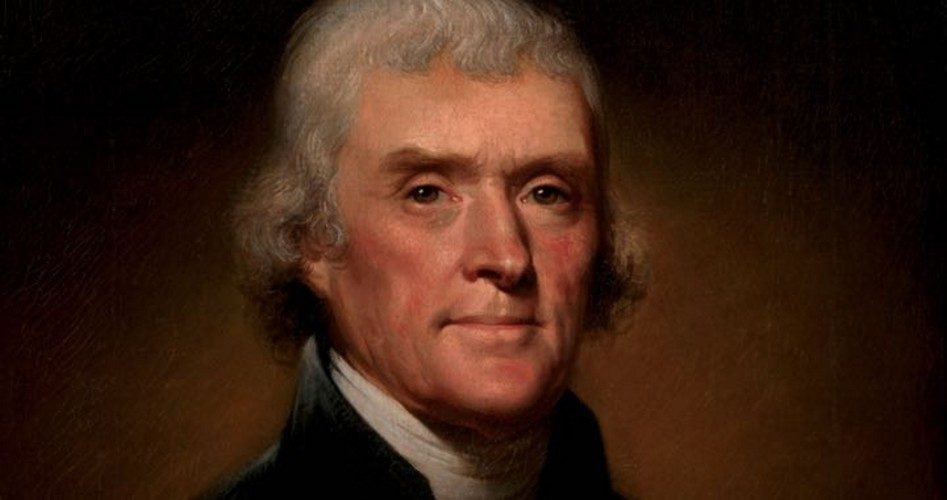
Monticello Magazine, published by the non-profit Thomas Jefferson Foundation that has owned and operated Jefferson’s historic home near Charlottesville, Virginia, since 1923, has opted in its Summer 2018 edition to repeat the unsupportable story that the nation’s third president fathered children by his slave Sally Hemings.
“Years after his wife’s death, Thomas Jefferson fathered at least six of Sally Hemings’ children, four of whom survived to adulthood and are mentioned in Jefferson’s plantation records: Beverly, Harriet, Madison, and Eston,” the magazine asserts as fact.
Although widely believed due to media misreporting, the actual facts indicate that this charge, that Thomas Jefferson fathered children by a slave, is highly unlikely.
The ugly rumor began when a disappointed office-seeker made the charge in 1802, while Jefferson was president. James Callender made the accusation in The Richmond Recorder, a well-known Federalist Party newspaper, which strongly opposed Jefferson and his Republican Party.
Callender incorrectly asserted that Sally Hemings accompanied Jefferson “in the same vessel” when he went to France. She did not travel with him; she came four years later as the caretaker of Jefferson’s daughter. In fact, Jefferson brought Sally’s brother to France, and the only child that Sally had in France, Tom, was proven by DNA tests not to be Jefferson’s child. Also, Jefferson was often gone from Monicello for years on end, reducing the chances that he fathered multiple children with a slave. Because of such inaccuracies, Callender’s sleazy reputation, and his obvious motives for revenge, most professional historians largely dismissed the accusations until Fawn Brodie resurrected them in her 1976 book, Thomas Jefferson: An Intimate History. Jefferson biographer Dumas Malone said it was amazing that any real scholar could give serious consideration to Brodie’s thesis, but her charges proved enough to convince some descendants of Sally Hemings and some descendants of Thomas Jefferson’s uncle to submit to a DNA analysis.
In a scientific DNA test of this nature, the samples must come from those in the direct male line, or male-to-male all the way from the person in the distant past to the present. It should be stressed that no DNA from Thomas Jefferson’s “direct line” was possible, as he had no living direct male descendants.
To overcome this problem, DNA samples were taken from a direct male descendant of Thomas Jefferson’s uncle, Field Jefferson. Other samples were obtained from direct male descendants of Eston Hemings, Sally’s youngest son. Another sample was taken from a direct male descendant of Thomas Woodson — Woodson’s descendants had long contended that he was a child of Thomas Jefferson and Sally Hemings. However, Eston Hemings’ descendants had never made any such claim about Eston.
The DNA testing found no link at all between Woodson and Thomas Jefferson. But what created a sensation, when the results were published, was that Eston was descended from a “Jefferson male,” or at least someone related to Jefferson’s paternal uncle, Field Jefferson.
While the family of Eston Hemings had a long-running family story that they were descended from a Jefferson “uncle,” it was not possible for Field Jefferson to have fathered Eston, as Field had died several years before Eston’s conception.
Unfortunately, the English journal Nature released the DNA findings in 1998 with the sensational title, “Jefferson Fathered Slave’s Last Child.” Doctor Eugene Foster, who conducted the DNA tests, later wrote that he was “embarrassed by the blatant spin” of the article. Foster added, “The genetic findings … do not prove that Thomas Jefferson was the father of one of Sally Hemings’ children.… We have never made that claim. My experience with this matter so far tells me that no matter how often I repeat it, it will not stop the media from saying what they want to in order to try to increase their circulation.… I am angered by it.”
Even the Jefferson Foundation once noted, “Dissenters have pointed to Jefferson’s younger brother, Randolph Jefferson, as a candidate for paternity, a possibility that would fit the DNA finding.” Despite this more accurate statement, they did not bother to include the Randolph Jefferson alternative in their recent Monticello Magazine article, instead choosing to just flatly assert that Jefferson not only fathered Eston, but “at least six of Sally Hemings’ children.”
Herbert Barger, a Jefferson family historian, explained that Randolph Jefferson “lived about 20 miles away” from Monticello. In fact, Randolph was known to have visited Monticello nine months prior to the birth of Eston. It should be reiterated that the DNA findings were not that Thomas Jefferson was the father of Eston Hemings, but instead that a “Jefferson male” was the ancestor of Eston’s descendants.
Randolph Jefferson had earned a reputation for socializing with Jefferson’s slaves. Isaac Jefferson, a former slave of Thomas Jefferson’s, later recalled that Randolph “used to come out among the black people, play the fiddle, and dance half the night.”
While it is not proven that Randolph was Eston’s father, it is clearly more likely than the conclusion that Thomas Jefferson was the father. In fact, until 1976, Eston’s descendants believed they were descended from a Jefferson “uncle.” While Randolph was Thomas Jefferson’s brother, not his uncle, this is the type of distortion common in family stories. Randolph, of course, was known by Thomas Jefferson’s acknowledged children as “Uncle Randolph,” and he was always referred to that way in family letters.
Clearly, the advocates of the thesis that Thomas Jefferson fathered Sally Hemings’ children must strain the evidence to reach the conclusion they have. Even Jefferson’s political opponent John Adams dismissed Callender’s ugly accusations as “mere clouds of unsubstantiated vapor.”
Noted historian Forrest McDonald, a devotee of the greatness of Jefferson’s arch-nemesis, Alexander Hamilton, was once inclined to believe the rumors, but after carefully reviewing all the evidence, including the 1998 DNA findings, concluded, “I’m always delighted to hear the worst about Thomas Jefferson. It’s just that this particular thing won’t wash.”
Unfortunately, Monticello Magazine has chosen, for motives uncertain, to ignore any contrary evidence, and just baldly assert that these ugly accusations about Thomas Jefferson are true. It seems that an organization dedicated to the preservation of the memory of Jefferson would want to provide the readers of its magazine with the facts found in this article.
Steve Byas is the author of History’s Greatest Libels, a challenge to false stories about famous people in history. One chapter of his book is dedicated to this “libel” about Jefferson.


